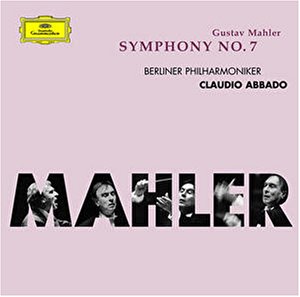Claudio Abbado’s relationship with the Berlin Philharmonic
has not always been an easy one but in the last couple of years a string
of remarkable recordings has worked its way onto CD – most recently
a stunning Falstaff. Now Deutsche Grammophon are set to release
three Mahler recordings recorded live with the Berlin Philharmonic in
Berlin and London. The first of those releases, the Third, recorded
at the Royal Festival Hall, is everything I remember it being: fabulously
rich in detail, profoundly moving and with a sense of perspective it
is rare to find in this symphony. It is one of those Mahler performances
you never forget, one to be spoken of in the same breath as Chailly
conducting Mahler’s First with the London Symphony Orchestra, Maazel
conducting the ‘Resurrection’ with the same orchestra, and, going further
back, Bernstein’s unforgettable Prom’s performance of Mahler’s Fifth
with the Vienna Philharmonic.
The second of the Mahler releases is this 2001 performance
of the Seventh (the final release will be of the Ninth) and is simply
fabulous, confirming Abbado as our greatest living Mahlerian. In no
other performance does the poetry of this work, or its visions of Romanticism,
seem so deftly caught (try, for example about 14 minutes into the opening
movement and the astounding articulation of the strings at 15’18 onwards):
no other conductor seems to make of this movement what Eliot called
‘time recollected in tranquillity’. The Berlin strings have an ethereal,
other-worldly quality, tangible to the touch. And in almost no other
performance does the immanent ambiguity of this work seem so resolved
by the time we reach the end of that most ambiguous of movements, the
Rondo.
Yet, this is also an intensely imagistic performance.
The symbolism of the march themes, of the repeated birdsong, of echoing
horns are less bewildering than they seem in less diaphanous performances,
rather like looking at a completed picture rather than the sketches
for one. Take the oboe duet in the second Trio of the first Nachtmusik,
for example; Abbado’s Berliners make this music genuinely, and hauntingly,
lyrical, something skated over by Rattle, Bernstein and Sinopoli. Move
on to the Scherzo and Abbado and his orchestra take this movement’s
shifting syncopations with something resembling a mist induced evening:
the nightmares are fleeting, the apparitions ghostly, images are half
seen. It is profoundly disturbing, striking in its anguish. Muted violins
are more sinister than usual, flute and oboe more piercing than the
usual jab in the dark. All of this is in enormous contrast to Abbado’s
delicate handling of the second Nachtmusik with its child-like
simplicity. The effect is of course magical – the sonority of mellow
strings, plucked chords and yearning woodwind as objective and unique
as it should be. Come to the disintegration of the coda and the sound
is pure confectionary – the bird-like twittering of the flutes in their
treble range and the muted violins, played here with perfect pianissimos,
are simply stunningly done.
The sheer scale of what Mahler achieved in the final
movement is staggering and this performance of the Rondo Finale
is superbly played, quite Rabelaisian in its spirit, with an electrifying
tempo swifter than either Bernstein or Sinopoli, neither of whom quite
summon up the incandescence of Abbado. The contrasts are thrillingly
drawn – day turns to night, hell turns to heaven and desolation turns
to triumph. The virtuoso playing adds focus to this paean of celebration
over adversity, and adds great contrast to what has preceded it. Abbado’s
triumph is to instil some sense of purpose, some sense of reasoning
to this movement’s ambiguity – and he does so persuasively. There is
a real sense that Abbado treats this Finale as the forward-looking masterpiece
that it is.


